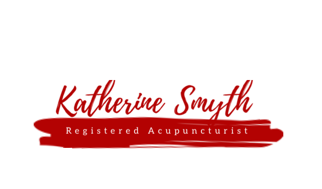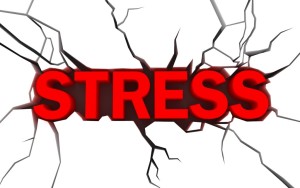The big scary word STRESS! This word alone may be enough to set your nerves on edge. We all deal with stress on a daily basis whether it is in the form of traffic jams, being late for work or major life events such as a divorce or job loss. When we are healthy and the stress is short lived, we are usually able to recover without too much wear and tear on our overall health. Some people may have a better ability to recover from a stressful event and deal with stress more effectively then others. If stress is extreme or long in duration it can have serious health risks on our mind, body, emotions and behavior.
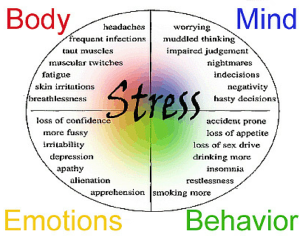 What is stress?
What is stress?
Stress can be defined as the brain’s response to any exterior or interior demand. Our bodies are hardwired to help us respond to stressful events. This response goes back to our ancient ancestors; in the wild we needed this reaction response to stay alive. This repose is called the fight or Flight response. Our sympathetic nervous system kicks in when there is a sign of a threat. Unfortunetly, this ‘fight or flight response doesn’t serve the right purpose anymore as we are no longing living in the wild being hunted by big monsters.
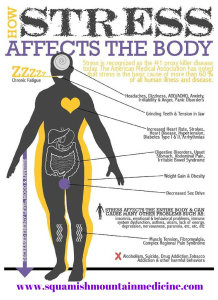 How does stress affect the body?
How does stress affect the body?
Over time a constant chronic state of stress can take its burdens on ones body. The chronic state of stress elevates the hormone called cortisol in our body. Cortisol is our body’s stress hormone. This chronic state of stress will increase ones blood pressure and suppress ones immune system and digestive systems functions. The impact on the body over time will develop increasing severity of the symptoms. Without proper treatment and coping mechanisms, the body will continue to shift out of balance and can develop into more sever ailments such as depression, anxiety, fatigue, tension headaches and digestive problems.
The TCM Perspective
Stress, depression, anxiety, and any other strong emotion disrupts the smooth flow of Qi (energy) though out the body. In the TCM theory, Qi (energy) flows through our entire body through a network (meridians). These networks of Qi are like roads. When our bodies are affect with stress, anxiety, depression or any other strong emotion it disturbs the free flow of Qi (energy) in the body, similar to a traffic jam. Many people complain of upper back pain, shoulder tension and pain and neck pain when they are very stressed out. This is because there is Qi (energy) stagnation and blockages in these areas from the stress. If left untreated this tightness and pain can develop into headaches, TMJ, and other problems. Stress will affect many parts of the body, our emotions, our minds and our behaviors on daily basis. Some of the areas affected by stress is digestion, problems sleeping, pain conditions, and elevated blood pressure. Stress can aggravate pre-existing health conditions as well.
Acupuncture is a great tool to helping the body focus in on these energy blockages and helps the body get back to its homeostasis state. Acupuncture can help Qi (energy) flow smoothly and alleviate stress, anxiety, depression, sleeping issues. Acupuncture works by triggering endorphins in the brain, the body’s natural pain-killing chemicals. Acupuncture also improves circulation throughout the body and helps cycle out cortisol and other waist chemicals. Acupuncture is also good at decreasing heart rate, lowering blood pressure and relaxing the tenense, ligaments and muscles.
7 Techniques for Stress Reduction 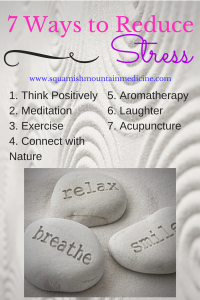
1. Think Positively
Is your glass half-full or half-empty? This age-old question reflects about how ones outlook on life, your attitude and your self-esteem. Thinking positively doesn’t mean you stick your head in the sand and ignore the stress of life’s unpleasant situations. Positive thinking means finding productive and positive ways to approach the troubles and un-comfortableness of life’s stress. Keeping your state of mind in a generally optimistic state will help you handle everyday stress in a more constructive way. The ability to be optimistic may take a bit of practice but positive thinking will contribute to significant health benefits.
2. Meditation
Learning to meditate can be very simple and it is very beneficial for your health and overall well-being. There are many forms of meditation not just sitting on your pillow and “om-ing” into another plane of reality. Active rest is a form of meditation where one is fully focused and present in the moment. Active rest can be rejuvenating and help you unwind after a long day. Actives such as listening to music, hanging out with close friends, reading your favorite book, or relaxing in the tub, can be all a forms of active rest meditation when practiced with mindfulness. Other meditation practices are easy to learn but do take practice. When you are practicing meditation on a regular basis it will reduce your level of stress though out the day and will help you become more mind/body aware.
3. Exercise
Our bodies crave movement and regular exercise increases our over all health and sense of well-being. Exercise helps to increase the production of endorphins in your brains. Regular exercise will increase ones self-confidence and lower the symptoms connected with depression and anxiety. Exercise also can improve your sleep. All this can ease your stress levels and give you a sense of control over your body and your life.
4. Connecting with Nature
Studies show that interacting with nature can help lessen the effects of stress on the nervous system, reduce attention disorders, decrease aggression, and enhance spiritual well-being. Vitamin D is essential vitamin for helping replenish our Adrenal glands; our bodies stress glands. Sunshine helps simulate the production of vitamin D in our bodies. So go out side get some sunshine and play in the forest, it will help reduce your stress.
5. Aromatherapy
There are many essential plant oils that can help you unwind and help you manage pain, anxiety, depression insomnia and other stress related disorders. Lavender oil for example enhances relaxation and reduces anxiety. Put a few drops of lavender oil on your pillow to have a more restful sleep.
6. Laughter
Ever had a great big belly laugh? How did you feel after? Most likely happy and relaxed. Humor alleviates stress and anxiety and prevents depression. Laughter can help lower blood pressure, enhance the immune system, elevate our mood and creativity, and helps us cope with pain. Humor is also connected to happiness, which has been linked to high self-esteem, outgoingness, and feeling in control. Unfortunately, however, many people don’t get enough laugher in their lives. One study reported that healthy children laugh as much as 400 times per day. Adults on the other hand tend to laugh only 15 times per day. So put your funny on and get laughing, it’s good for you and helps reduce stress.
7. And of course Acupuncture!!
Most people who get regular acupuncture treatment will tell you that they feel relaxed and peaceful during and after treatment. People also seem to handle the big and small stresses and challenges of life with less effort and more ease. There have been many studies that have demonstrated the benefits of acupuncture on treating disorders of depression and anxiety. Along with treating depression and anxiety, acupuncture releases endorphins in the brain, helps relax muscles and lowers blood pressure among many other benefits. If your feeling stress booking yourself a de-stress acupuncture treatment and watch your stress melt away.



